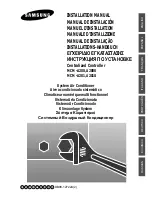
Page 5
TSA*H4 SERIES
Recovering Refrigerant from Existing System
Use the following procedure to recover refrigerant from an existing system (indoor coil, line set and outdoor unit).
SERVICE
DISCONNECT
SWITCH
Disconnect all power to the existing outdoor unit at the service
disconnect switch or main fuse box/breaker panel.
DISCONNECT POWER
CONNECT MANIFOLD GAUGE SET
MANIFOLD GAUGES
RECOVERY MACHINE
CLEAN RECOVERY
CYLINDER
OUTDOOR UNIT
HIGH
LOW
Connect a gauge set, clean recovery cylinder and a recovery
machine to the service ports of the existing unit. Use the
instructions provided with the recovery machine to make the
connections.
METHOD 1:
Us this method if the existing outdoor unit is not equipped with shut-off valves, or if the unit is not operational and you plan to use the existing
HCFC-22 to flush the system.
Remove all HCFC-22 refrigerant from the existing system. Check gauges after shutdown to confirm that the entire system is completely void of
refrigerant.
METHOD 2:
Use this method if the existing outdoor unit is equipped with manual shut-off valves, and you plan to use new HCFC-22
refrigerant to flush the
system.
The following devices could prevent full system charge recovery into the outdoor unit:
Outdoor unit's high or low-pressure switches (if applicable) when tripped can cycle the compressor
OFF
.
Compressor can stop pumping due to tripped internal pressure relief valve.
Compressor has internal vacuum protection that is designed to unload the scrolls (compressor stops pumping) when the pressure ratio meets
a certain value or when the suction pressure is as high as 20 psig. (Compressor suction pressures should never be allowed to go into a vacuum.
Prolonged operation at low suction pressures will result in overheating of the scrolls and permanent damage to the scroll tips, drive bearings and
internal seals.)
Once the compressor can not pump down to a lower pressure due to one of the above system conditions, shut off the vapor valve. Turn OFF the
main power to unit and use a recovery machine to recover any refrigerant left in the indoor coil and line set.
Perform the following task:
A
Start the existing HCFC-22 system in the cooling mode and close the liquid line valve.
B
Use the compressor to pump as much of the existing HCFC-22 refrigerant into the outdoor unit until the outdoor system is full. Turn the outdoor unit
main power OFF and use a recovery machine to remove the remaining refrigerant from the system.
NOTE — It may be necessary to bypass the low pressure switches (if equipped) to ensure complete refrigerant evacuation.
C
When the low side system pressures reach 0 psig, close the vapor line valve.
D
Check gauges after shutdown to confirm that the valves are not allowing refrigerant to flow back into the low side of the system.
Remove existing HCFC-22 refrigerant using one of the following procedures:
RECOVERING REFRIGERANT
IMPORTANT
— Some system configurations may contain higher than normal refrigerant charge due to either large internal coil volumes,
and/or long line sets.
1
2
3
Figure 3. Refrigerant Recovery Procedure






































